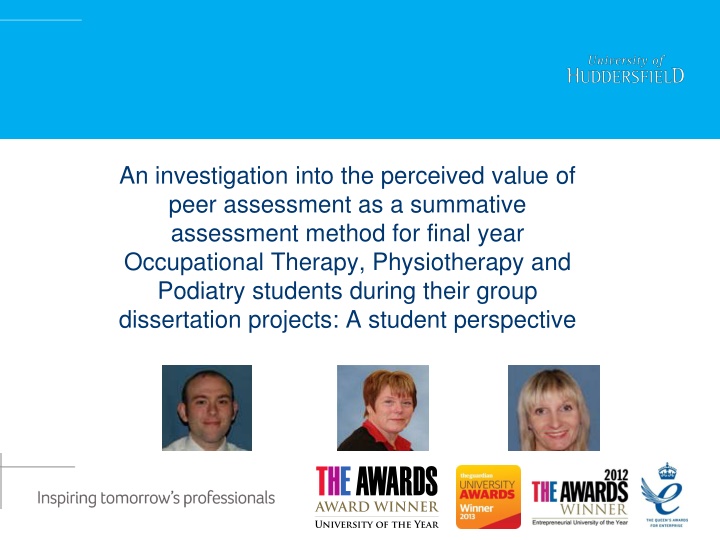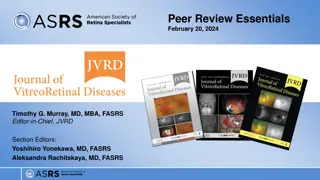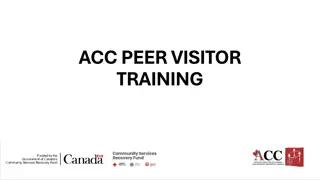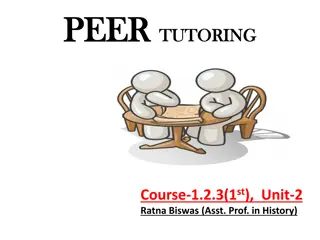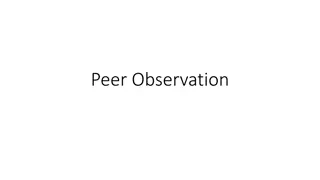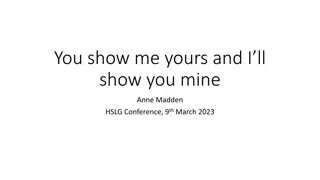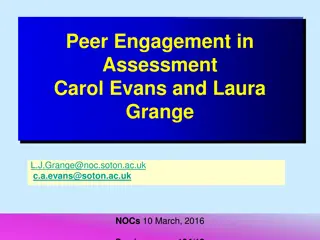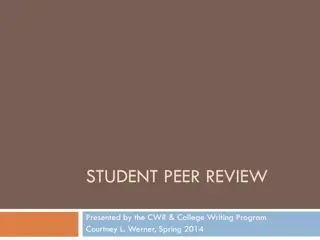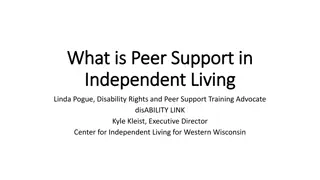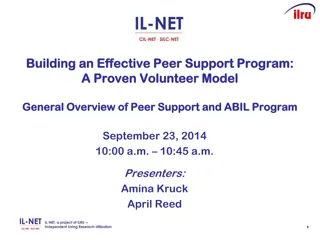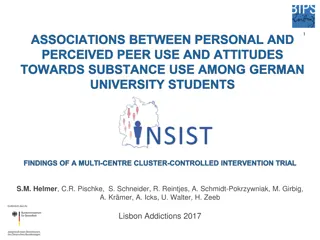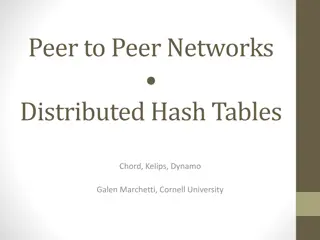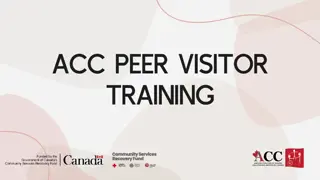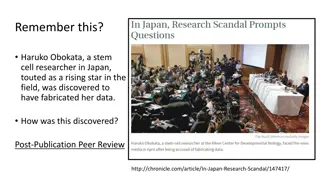Perceived Value of Peer Assessment in Inter-professional Research Projects
Exploring the use of peer assessment as a summative evaluation method for final year Occupational Therapy, Physiotherapy, and Podiatry students during group dissertation projects. Emphasizing the importance of inter-professional collaboration and the ability to provide and receive constructive criticism. Insights into the breakdown of a research module, including individual and group components weighted by peer assessment scores.
Download Presentation

Please find below an Image/Link to download the presentation.
The content on the website is provided AS IS for your information and personal use only. It may not be sold, licensed, or shared on other websites without obtaining consent from the author.If you encounter any issues during the download, it is possible that the publisher has removed the file from their server.
You are allowed to download the files provided on this website for personal or commercial use, subject to the condition that they are used lawfully. All files are the property of their respective owners.
The content on the website is provided AS IS for your information and personal use only. It may not be sold, licensed, or shared on other websites without obtaining consent from the author.
E N D
Presentation Transcript
An investigation into the perceived value of peer assessment as a summative assessment method for final year Occupational Therapy, Physiotherapy and Podiatry students during their group dissertation projects: A student perspective
Inter-professional work Interdisciplinary work is becoming the norm in UK health care Ability to give and receive criticism in order to enhance achievement of shared goals is essential (Nancarrow et al, 2013). Confidence to assess peers could lead to improvements in overall care (Francis 2013)
Inter-professional research at undergraduate level Students work in small groups to undertake a piece of empirical research Examples include:- - Systematic literature reviews - Qualitative projects - Quantitative projects - Clinical audits
Research 3 module breakdown An individual 6,000 word dissertation 75% module mark Group presentation at conference 25% module mark Individual mark for group work depends on scores of peer assessment
Peer assessment sheet Data Collection Group Member Overall ability Takes responsibility for a group task/s Demonstrates negotiation skills Ability to listen support and respond to group members Overall contribution to the data collection process to work as a member of the team 30 40 30 35 40 W. Rooney S. Gerrard 30 30 30 35 30 J. Hart 20 15 20 15 15 F. Lampard 20 15 20 15 15 R. Sterling 100 100 100 100 100 Total
An example Student A and Student B are from the same group Student A Student B Dissertation score 72% 72% Group score presentation 62% 62% Peer weighting assessment 1.1 0.9 Individual group presentation score for 68% 56% Overall module score 71% 68%
Aim and Objectives Aim To explore students perceptions of peer assessment. Objectives Explore the perceived confidence in their ability to peer assess Explore their perceived benefits and limitations of peer assessment Explore whether it is a meaningful way to peer assess summatively
Sampling and data collection Purposive sample of final year podiatry, physiotherapy and occupational therapy students. Recruitment took place after final marks for the module had been awarded Two focus groups (n=5 and 3) Questions and prompts generated from aims and objectives
Data Analysis Conventional content analysis using a thematic approach (Hsieu-Fang and Shannon 2005) Themes were derived by the three researchers independently and consensus was reached through discussion
Data Analysis - teamwork Highlighter pens and ring binders Word processed, numbered and indexed lists Scraps of paper with doodles and diagrams
Findings Level 4 themes:- The process of peer assessment (+ve and ve) The influence of peer assessment on group work (+ve and ve)
Level 1 Level 2 Level 3 Level 4 Influence on degree More guidance/criteria Understanding of process Process of peer assessment Influence on degree More guidance/criteria How to measure effort vs contribution Trust/confidence in assessment skills More guidance/criteria Responsibility Skill eg IT deserves more? Attendance = work? Leader deserves more? Skill eg IT deserves more? Attendance = work? Lack of numeracy skills Lack of numeracy skills Lack of transparency feedback Lack of transparency Lack of feedback Timing of peer assessment Confidentiality (at conference) Effort should be rewarded Unfairness Timing of peer assessment Logistics of assessment Confidentiality (at conference) +ve perceptions of peer assessment -ve perceptions of peer assessment Perceptions
Key quotes - Process of peer assessment They haven t got to prove that you ve not done that work and you can t defend yourself and say no I have done that work (162, W3, pg 8) because I do think there is a lot of, you get on really well therefore you ll dish out even marks (235, W1, pg 11)
Key quotes - Process of peer assessment we d be thinking of that person who only got 40% in their thing [dissertation] and we were trying to make it up save them, even though we all worked hard we were thinking of that poor person. (FG1, P6) You ve got all this pressure o filling it in and you re trying to calculate how much a hundred works out between seven (FG1. P 26)
Blame Suspicious Liked/ or not Sly/ lack of trust Insecurities Fairness Honesty Academic ability Balancing commitments Support Caring Pressure Emotional: Stress Performance in group (Take over/ disengage) Sensitivity regarding bullying behaviours Assessment focussed Influence of peer assessment on group work Personal tensions Strategic traits Negotiation Control Meaning Professional Groups: Alliances Selfish Worry about free-riders Deliberate free-riding Down-grading colleagues Ensuring colleagues passed Professional Groups: Alliances Free riding Manipulation of marks Interprofessional issues
Key quotes - Influence of peer assessment on group work (+ve) if you didn t do peer review it would give some people the option not to get involved .. and you [the tutor] would not know who has put the work in. (FG1, P1) It encouraged people to make sure that everyone tried to take an equal part . (FG2)
Key quotes - Influence of peer assessment on group work (-ve) I think it was difficult at times because certain people wanted to do well erm, and so they try, they would try and ensure that they could take on as many jobs as possible (FG 2 line 29 - ) I think there is a problem, I think people see it as a way to get marked up. FG 1 line 43
Conclusions .Objectives Explore the perceived confidence in their ability to peer assess Explore their perceived benefits and limitations of peer assessment Explore whether it is a meaningful way to peer assess summatively Findings Participants did not feel confident to peer assess Helped prevent free riders but could also skew work rate/activities Peer assessment is a good idea but our method needs tweaking
Literature Students have mixed perceptions of Peer Assessment (Kench, Field and Agudera 2009) Peer assessment is often used to prevent free riding in group work (Maiden and Perry 2010) Peer assessment carries some risks of bullying (Elliott and Higgins 2004) Much of the research is quantitative in nature and based on uni-professional group work
Recommendations/ considerations Clearer information to be provided as part of module including example calculation to demonstrate the impact of the process Consider transparency of the process remove anonymity? Consideration of timings and methods Introduce peer assessment formatively earlier in the degree More involvement from supervisors to help develop peer assessment skills/ devise group-specific criteria.
What next? Nurses (adult, child, mental health, learning disability) Midwives Operating department practitioners Podiatrists Physiotherapists Occupational therapists
Thank you for your time. ANY QUESTIONS?
References Francis, R. (2013) Report of the Mid Staffordshire NHS Foundation Trust Public Enquiry [online] available at http://www.midstaffspublicinquiry.com/sites/default/files/report/Executive%20summar y.pdf [last accessed 16th September 2013] Hsieu-Fang, H. and Shannon, S.E. (2005) Three approaches to qualitative content analysis Qualitative Health Research No.15, pp 1277 1288 Kench, P.L., Field, N., Agudera, M., and Gill, M., (2009) Peer assessment of individual contributions to a group project: student perceptions. Radiography No 15 pp158 - 165 Maiden, B. and Perry, B. (2010) Dealing with free-riders in assessed group work: results from a UK university Assessment and Evaluation in Higher Education Vol. 36, No. 4, pp 451 464
